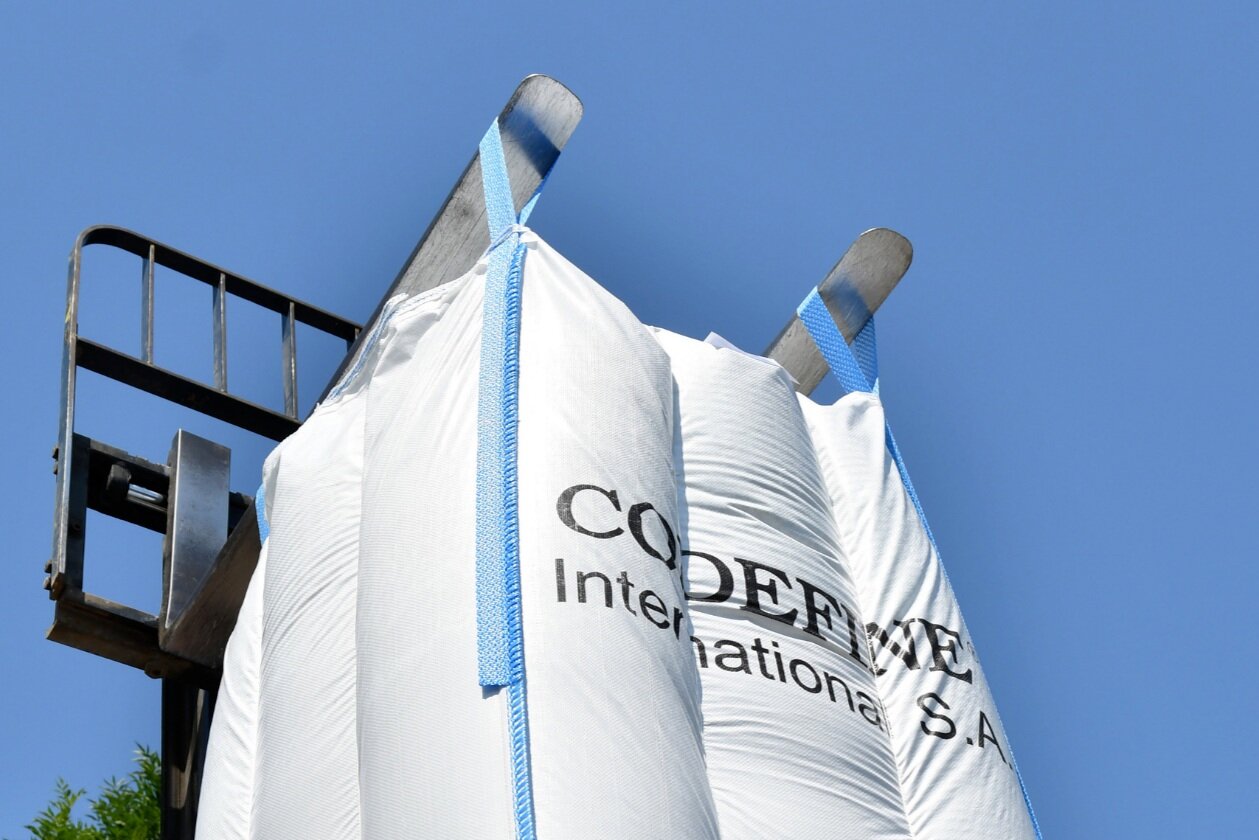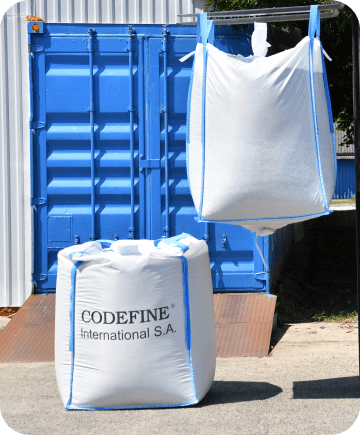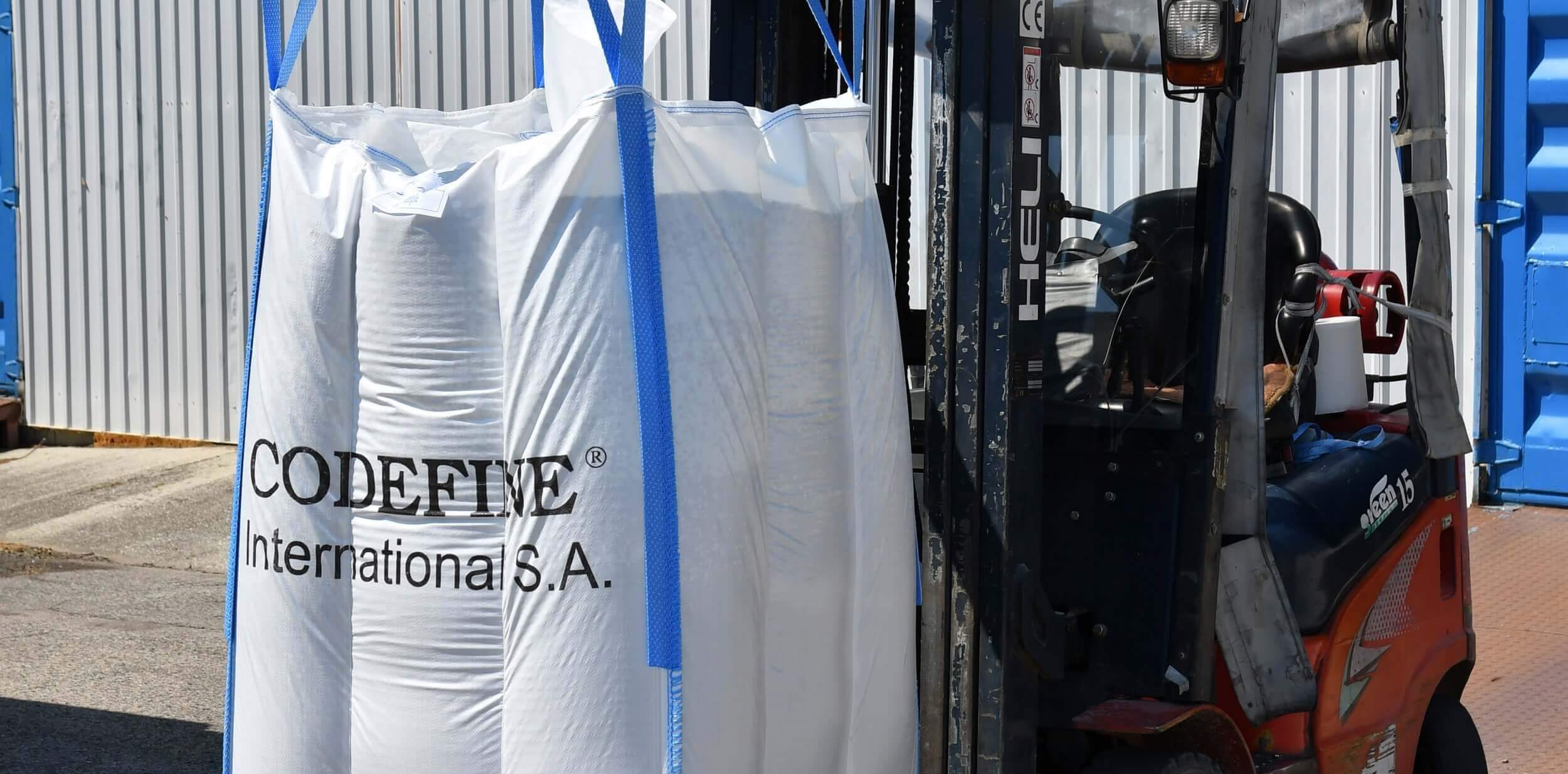Home » Posts Page » Blog » Guide to Different Types of FIBC Bags

Many industry sectors depend on FIBC bulk bags. All types are hard-wearing and easy to use, but some are better suited for certain applications.
Type A and Type B bags are practical for everyday storage and transporting non-hazardous materials. However, they offer more electrostatic protection. By contrast, sturdier Type C bags can be used to store more sensitive materials and protect against brush discharges. However, even these have to be grounded to ensure safety. Type D bags are a more convenient alternative, with no need for grounding as you fill and release contents. For more details see below and try our FIBC bag calculator to find the best option for your needs.
As they are made from woven polypropylene, Type A FIBC bags offer no static protection. If you’re using one of these as an intermediate bulk container, the material inside can produce static electricity when it rubs against the bag itself. This is even more of an issue when it comes to filling and emptying bulk bags. As such, Type A FIBC bulk bags aren’t suitable for transporting or storing hazardous or combustible materials. Furthermore, you should avoid using these bulk bags in combustible or high-temperature environments.
At first glance, Type B FIBC bags might look indistinguishable from Type A big bags. They boast a similar construction, although the material uses a lower breakdown voltage, making these bags slightly more conductive. In certain situations, Type B bags can be used as intermediate bulk containers for transporting some combustible materials, such as dry powders.
While the coating of Type B bags affords them some protection, you need to be careful when using them in certain environments. These bags can prevent propagating brush discharges from happening, but they’re not completely anti-static. Take care to ensure the outside of the bag doesn’t become contaminated with anything flammable or conductive solutions, as an outside spark can ignite these.
By contrast, FIBC Type C bags are considered conductive. The woven construction and non-conductive material grounds electrostatic charges, making FIBC Type C bags suitable for hauling flammable items. They’re also suitable for use in environments where flammable gasses, vapors, and dust are present.
While the gridded weave of these bulk bags makes them one of the best conductive FIBC options around, you need to be careful when using them. They’re only electrically conductive if they’re grounded, so extra measures need to be taken during filling and emptying. Clearly defined grounding points will make life easier in this regard. Type C bags also need to be regularly checked for signs of damage. Multiple elements make these bulk bags groundable, including lifting loops and reinforced seams. If any of these are compromised, a Type C FIBC bag may no longer be fit for purpose.
Type D FIBCs are a more practical choice for demanding environments. As with Type C bags, Type D anti-static FIBC bulk containers are resistant to brush discharges and sparks. However, the key advantage here is they don’t need to be grounded during filling and emptying. This can speed up workflows considerably and puts less stress on health and safety personnel.
Type D bags can be used to transport flammable materials and utilized in environments where solvents and combustible gasses are present. However, you’ll still need to be cautious when using them. If the material is contaminated with water or grease, the charge dispersion credentials of the bag are affected. Nearby conductive objects also need to be grounded during the filling and emptying of a Type D FIBC bag.

Both Type C and Type D bags can be used to transport materials like flammable powder. Because they need to be grounded during filling and emptying, Type C bags aren’t the most practical choice. Type D FIBCs are a better choice if you’re looking for a flexible intermediate bulk container, but even with these, you need to carry out meticulous safety checks to limit the chance of ignition. Flame retardant fabric may be used.

U panel FIBC bags are made of three individual panels. One panel forms the sides and base of the bag itself, while another two panels make up the other ends. When filled, a U panel FIBC bag takes on practical cube-shaped dimensions. These types of FIBC bags are particularly durable, with impressive working loads that make them a popular choice for industrial applications.
As the name suggests, 4 panel bags are made of four individual panels that are joined together to form a square-shaped container. A four panel bag is typically more durable than a u-panel one, holding its shape well when fully filled. However, a 4 panel bulk bag is well-suited to storage.
Unlike panelled bag types, a circular FIBC bulk bag is made from just two pieces of material. A large tubular panel forms the sides of the container, while a second round panel is stitched to the bottom to form a base. These types of FIBC Bags might look circular when empty, but they take on squarer dimensions when filled.
FIBC baffle bags are a more hard-wearing alternative. Basic versions of the bags outlined above can become damaged if used intensively. Baffle FIBC containers are more robust, with the additional fabric providing much-needed reinforcement. A FIBC baffle bag isn’t just more durable, it’s also better for stacking, making this type of container ideal for spaces with limited storage capacity. You can learn about our container liners as well.
FIBC bags are widely used in agricultural settings. A cost-effective alternative to containers, agriculture bulk bags can be used for storing and transporting crops, as feed sack bags, and more. Although they don’t provide the same level of aeration as vegetable net bags and produce net bags, they’re perfect as a short-term storage and haulage solution. With so many applications, agriculture bags are a farmer’s best friend.
A key agricultural application of FIBC bags is keeping animal products protected from contamination. If a vermin infestation has compromised bulk feed bags, the cost to a business can be devastating. Thankfully, FIBC bags can be used as a substitute for an animal feed bag, keeping pests out.
Food grade FIBC bags are regularly used in the packaging industry. A typical food grade bag can perform well for a long time, making them suitable for storing non-perishable items, as well as large quantities of nuts, rice, and cereal grains. They can prevent contamination during transportation and storage.
When we talk about pharma grade FIBC, we’re not talking about paper pharmacy bags. The best FIBC bags can safeguard pharmaceutical products against contamination. Furthermore, all pharma-grade bags need to be made from virgin material and contain no recycled elements that might impact the quality of the products they’re storing or hauling.
These types of FIBC bags require rigorous testing to ensure they meet demanding UN requirements. UN-certified bags are typically used for storing or transporting hazardous materials that have the potential to cause chemical burns, toxic contamination, or environmental damage.
Bulk bags are a common sight in the chemical industry. These bags are designed to be safe and secure for high-temperature environments, making them more robust than everyday FIBC containers. This packaging for chemical products is generally used to store and transport materials such as powder coating chemicals, sodium cyanide, and calcium carbonate.
FIBCs are regularly used as heavy duty construction bags. They’re the go-to for moving large quantities of finer materials, such as gravel or sand. Large heavy construction bags can also be used to haul bulkier materials, such as metal, lumber, stone, and cement. FIBC bags are easily filled and emptied, while the square-shaped design means they can be loaded onto pallets with minimal effort.
Mining bags need to be strong and flexible. FIBCs are the obvious choice here, offering a cost-effective solution for handling and hauling heavy loads of mined material. Their sturdy construction makes them a good choice for crystal mining bags, preventing accidental spills in transit. They’re also easy to load onto pallets and trucks, boosting the production capabilities of a typical mining operation.